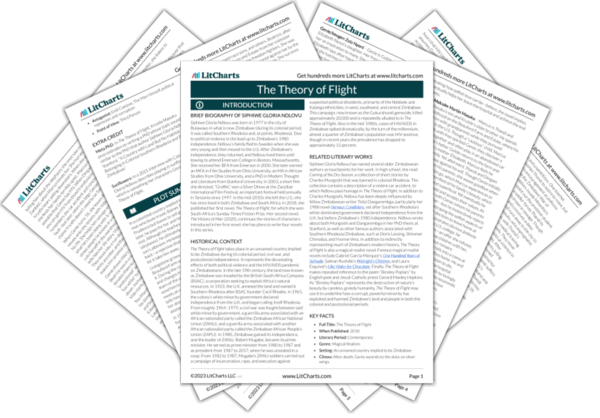Marcus Malcolm Martin Masuku Quotes in The Theory of Flight
Well, Marcus Malcolm Martin Masuku, you can be friends with my Genie here if you promise me one thing. Can you promise me one thing? […] Promise me that you will not become a politician . . . promise me you will become a real revolutionary instead.
So engrossed were they in their travels that it took them a while to notice that shoots were beginning to rise out of the reddish-brown earth. The sunflowers were being reborn. This was how they learned their most valuable lesson about death—that after it there is life again, that things that perish will rise again, that after every ending there is another beginning.
“We are your family now,” his new grandmother said, still not smiling. They all looked beautiful, the members of his family, but Marcus felt that their beauty was not to be trusted. It was a dangerous beauty. He was suddenly more terrified than he had ever been before. He let go of his bladder then, well aware that his urine would soil both his shorts and his mother’s shiny dress.
“You understand that in the grander scheme of things you are but a speck . . . a tiny speck , , , and that that is enough. There is freedom, beauty even, in that kind of knowledge . . . and it is the kind of knowledge that finally quiets you. It is the kind of knowledge that allows you to fly.”
It was only when he saw Genie looking at the things he had created with awe and wonder, only when he saw one hand traveling to her mouth to cover an “O” that had already escaped, only when he saw the other hand reaching out to touch him gently on the shoulder, only when she looked at the things he had created as things of utter beauty, only when she whispered, “I knew it. I knew you were special. I knew it,” her brilliant eyes never leaving the sculptures, it was only then that he realized that the things he created could actually have lives of their own—beyond him.
He heard his father’s voice say: “There are many ways to be a man. Always remember that.” He knew that in uttering these words his father had prepared him for precisely a moment such as this. His father had spoken the words at a time when Vida had needed absolute understanding and acceptance. And this was a time in Genie’s life when she needed absolute understanding and acceptance.
“Promise me you will never speak to me of love,” she said. She looked at him and ran the back of her hand idly over his chest. “To not have to speak of love is such a freeing thing.”
“It is too intimate, this interference, this role the state plays in our lives,” Minenhle says, looking him in the eye. “Too intimate.”
This is where he belongs.

Marcus Malcolm Martin Masuku Quotes in The Theory of Flight
Well, Marcus Malcolm Martin Masuku, you can be friends with my Genie here if you promise me one thing. Can you promise me one thing? […] Promise me that you will not become a politician . . . promise me you will become a real revolutionary instead.
So engrossed were they in their travels that it took them a while to notice that shoots were beginning to rise out of the reddish-brown earth. The sunflowers were being reborn. This was how they learned their most valuable lesson about death—that after it there is life again, that things that perish will rise again, that after every ending there is another beginning.
“We are your family now,” his new grandmother said, still not smiling. They all looked beautiful, the members of his family, but Marcus felt that their beauty was not to be trusted. It was a dangerous beauty. He was suddenly more terrified than he had ever been before. He let go of his bladder then, well aware that his urine would soil both his shorts and his mother’s shiny dress.
“You understand that in the grander scheme of things you are but a speck . . . a tiny speck , , , and that that is enough. There is freedom, beauty even, in that kind of knowledge . . . and it is the kind of knowledge that finally quiets you. It is the kind of knowledge that allows you to fly.”
It was only when he saw Genie looking at the things he had created with awe and wonder, only when he saw one hand traveling to her mouth to cover an “O” that had already escaped, only when he saw the other hand reaching out to touch him gently on the shoulder, only when she looked at the things he had created as things of utter beauty, only when she whispered, “I knew it. I knew you were special. I knew it,” her brilliant eyes never leaving the sculptures, it was only then that he realized that the things he created could actually have lives of their own—beyond him.
He heard his father’s voice say: “There are many ways to be a man. Always remember that.” He knew that in uttering these words his father had prepared him for precisely a moment such as this. His father had spoken the words at a time when Vida had needed absolute understanding and acceptance. And this was a time in Genie’s life when she needed absolute understanding and acceptance.
“Promise me you will never speak to me of love,” she said. She looked at him and ran the back of her hand idly over his chest. “To not have to speak of love is such a freeing thing.”
“It is too intimate, this interference, this role the state plays in our lives,” Minenhle says, looking him in the eye. “Too intimate.”
This is where he belongs.











